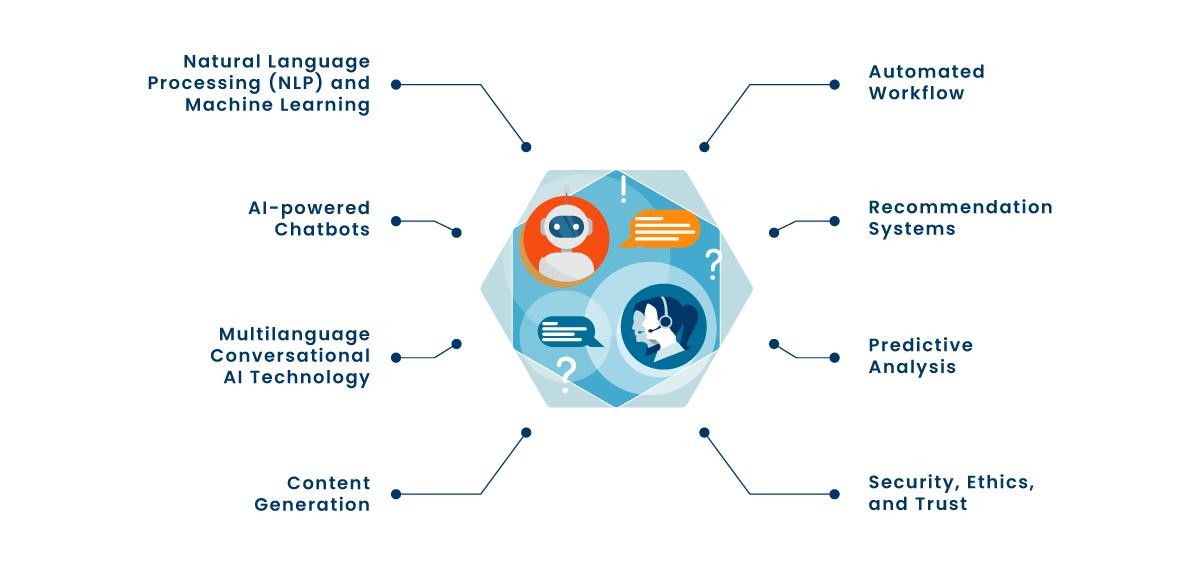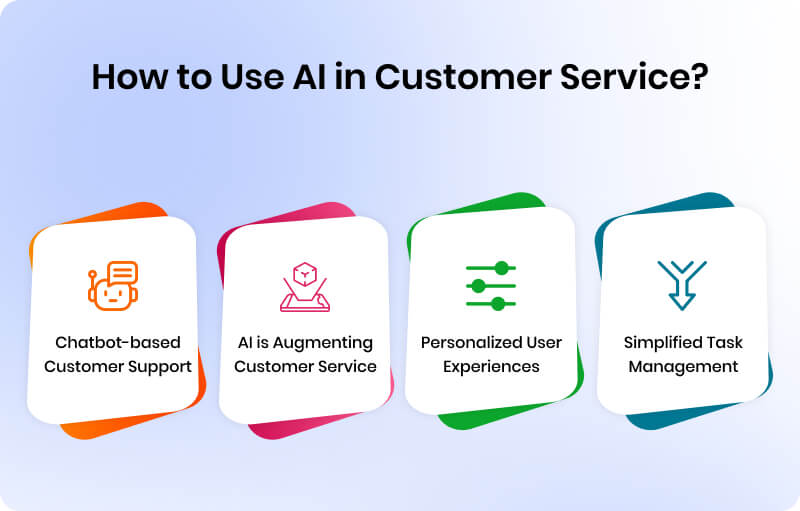Introduction
Artificial Intelligence (AI) is transforming customer service, offering businesses new ways to engage with customers, streamline operations, and improve overall service quality. AI-driven solutions like chatbots, virtual assistants, and sentiment analysis tools are being widely adopted across industries, providing faster and more personalized customer interactions. This blog explores the various ways AI enhances customer service, highlighting its advantages, benefits, use cases, and types.
What is AI in Customer Service About?
AI in customer service involves leveraging advanced technologies such as machine learning, natural language processing (NLP), and robotic process automation (RPA) to automate and enhance customer interactions. By analyzing large volumes of data, AI can predict customer needs, provide instant responses, and offer personalized recommendations, thereby improving the overall customer experience. The goal is to create efficient, accurate, and engaging customer service processes that meet the evolving expectations of customers.

Advantages of AI in Customer Service
24/7 Availability AI-powered customer service solutions, such as chatbots and virtual assistants, provide round-the-clock support, ensuring that customers can get assistance at any time. This continuous availability helps businesses cater to global customers in different time zones without the need for additional staffing. For instance, e-commerce giants like Amazon use AI-driven chatbots to handle customer queries outside of regular business hours, improving customer satisfaction and retention.
Scalability AI systems can handle a large volume of customer interactions simultaneously, making it easier for businesses to scale their customer service operations. Unlike human agents, AI can manage multiple conversations at once without compromising the quality of service. Companies like H&M use AI chatbots to assist thousands of customers simultaneously during peak shopping seasons, ensuring that all queries are addressed promptly.
Consistency AI ensures that all customers receive consistent and accurate information. Human agents may vary in their responses, but AI systems provide standardized replies based on programmed data and algorithms. This consistency is crucial for maintaining brand integrity and customer trust. For example, banking institutions use AI to provide uniform answers to frequently asked questions, ensuring that all customers receive the same level of service.
Cost Efficiency Implementing AI in customer service can significantly reduce operational costs by automating routine tasks and reducing the need for a large customer service team. This allows businesses to allocate resources more efficiently and focus on more complex customer issues. Startups and SMEs benefit greatly from AI by minimizing customer service expenses while still providing high-quality support.
Data-Driven Insights AI systems can analyze customer interactions and feedback to generate valuable insights into customer preferences, pain points, and behavior patterns. These insights help businesses make informed decisions to enhance their products and services. For example, AI tools used by Netflix analyze viewing habits to recommend content that aligns with individual preferences, thereby improving user engagement and satisfaction.

Benefits of AI in Customer Service
Improved Customer Satisfaction AI enhances customer satisfaction by providing quick, accurate, and personalized responses. Customers appreciate the efficiency and convenience of AI-driven support, which leads to higher satisfaction rates. For instance, AI chatbots on social media platforms can resolve customer complaints swiftly, leading to positive reviews and increased loyalty.
Enhanced Customer Experience AI technologies like NLP and machine learning can personalize interactions by understanding customer context and preferences. This leads to a more engaging and tailored customer experience. For example, AI-driven recommendation engines used by e-commerce platforms suggest products based on browsing history and purchase patterns, making the shopping experience more relevant and enjoyable.
Faster Resolution Times AI can quickly process and analyze customer queries to provide immediate solutions, reducing the time customers spend waiting for assistance. This is particularly beneficial in industries like telecommunications, where quick issue resolution is critical for customer satisfaction. Telecom companies use AI to diagnose and troubleshoot network issues in real-time, significantly reducing downtime for customers.
Proactive Customer Support AI can predict potential issues and address them before they escalate into problems, offering proactive support that enhances the customer experience. For instance, AI in predictive maintenance systems used by manufacturing companies can alert customers about potential equipment failures, allowing for timely interventions and preventing costly downtimes.
Empowered Human Agents AI assists human agents by handling routine inquiries and providing them with relevant information, allowing them to focus on more complex and high-value tasks. This collaboration improves the efficiency and effectiveness of customer service teams. In call centers, AI tools can provide agents with real-time data and suggestions during customer interactions, improving the quality of service provided.

Use Cases of AI in Customer Service
Chatbots and Virtual Assistants AI-driven chatbots and virtual assistants handle a wide range of customer service tasks, from answering FAQs to processing orders. For example, Sephora’s AI chatbot on their website and mobile app helps customers find products, provides beauty advice, and assists with purchases, enhancing the overall shopping experience.
Voice Assistants Voice-activated AI assistants like Amazon’s Alexa and Google Assistant provide hands-free customer support, making it easier for users to get information and perform tasks through voice commands. These assistants are integrated into smart home devices, allowing users to control their environment, access services, and get real-time information seamlessly.
Sentiment Analysis AI-powered sentiment analysis tools analyze customer feedback from various channels, such as social media, reviews, and surveys, to gauge customer sentiment and identify areas for improvement. Companies like HubSpot use sentiment analysis to monitor customer feedback and adjust their strategies to better meet customer expectations.
Automated Email Responses AI systems can automate email responses, providing quick and accurate replies to customer inquiries. This is particularly useful for handling high volumes of email traffic. For example, travel agencies use AI to manage booking confirmations, itinerary changes, and customer queries, ensuring timely and accurate communication.
Recommendation Engines AI recommendation engines analyze customer data to suggest products or services that align with individual preferences. This personalized approach enhances the customer experience and drives sales. Streaming services like Spotify use AI to create personalized playlists based on users’ listening habits, increasing user engagement and satisfaction.

Types of AI in Customer Service
Rule-Based AI Rule-based AI systems operate on predefined rules and logic to handle specific tasks. These systems are effective for simple, repetitive tasks like answering FAQs or processing standard transactions. Rule-based chatbots are commonly used in customer service to provide quick responses to routine inquiries.
Machine Learning-Based AI Machine learning-based AI systems learn from data to improve their performance over time. These systems can handle more complex tasks and provide personalized responses. For instance, AI-powered customer service platforms like Zendesk use machine learning to analyze customer interactions and improve response quality.
Natural Language Processing (NLP) AI NLP AI systems understand and process human language, enabling them to interpret and respond to customer queries accurately. This technology is used in chatbots, virtual assistants, and sentiment analysis tools. Companies like OpenAI use NLP to develop advanced conversational agents that can understand and respond to a wide range of customer inputs.
Voice Recognition AI Voice recognition AI systems convert spoken language into text and respond to voice commands. These systems are used in voice assistants and IVR (Interactive Voice Response) systems. Businesses like Apple utilize voice recognition in their Siri assistant to provide hands-free customer support and interaction.
Robotic Process Automation (RPA) RPA involves using AI to automate repetitive tasks that are typically performed by humans. In customer service, RPA can handle tasks such as data entry, order processing, and ticket management. Companies like UiPath offer RPA solutions that streamline customer service operations, increasing efficiency and reducing manual workload.

Conclusion
The integration of AI in customer service is revolutionizing the way businesses interact with their customers. By leveraging AI technologies, companies can provide 24/7 support, scale their operations, and deliver consistent, personalized, and efficient customer experiences. The advantages, benefits, use cases, and various types of AI in customer service highlight the transformative potential of this technology. As AI continues to evolve, it will play an increasingly critical role in shaping the future of customer service, driving innovation, and setting new standards for customer engagement and satisfaction.
